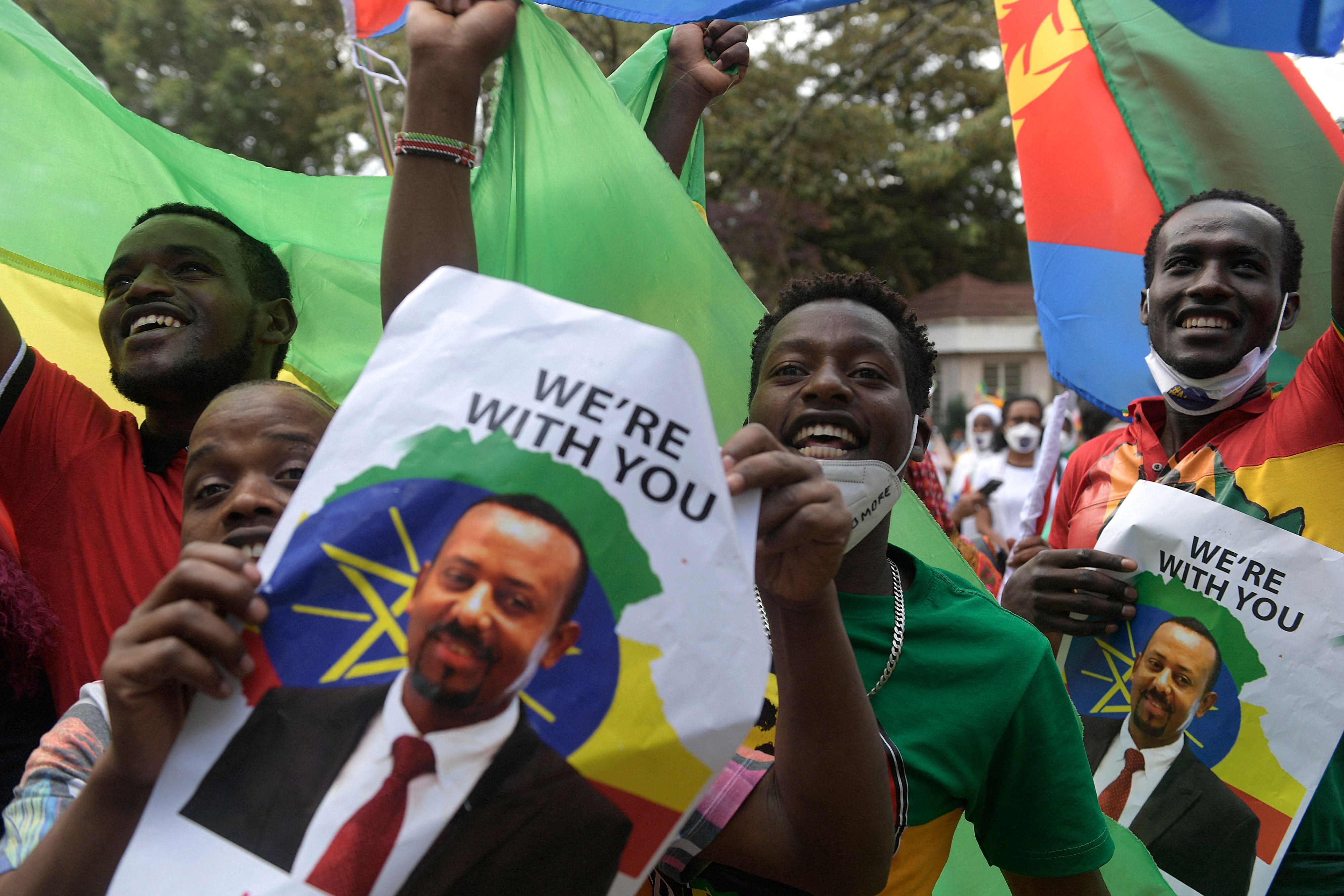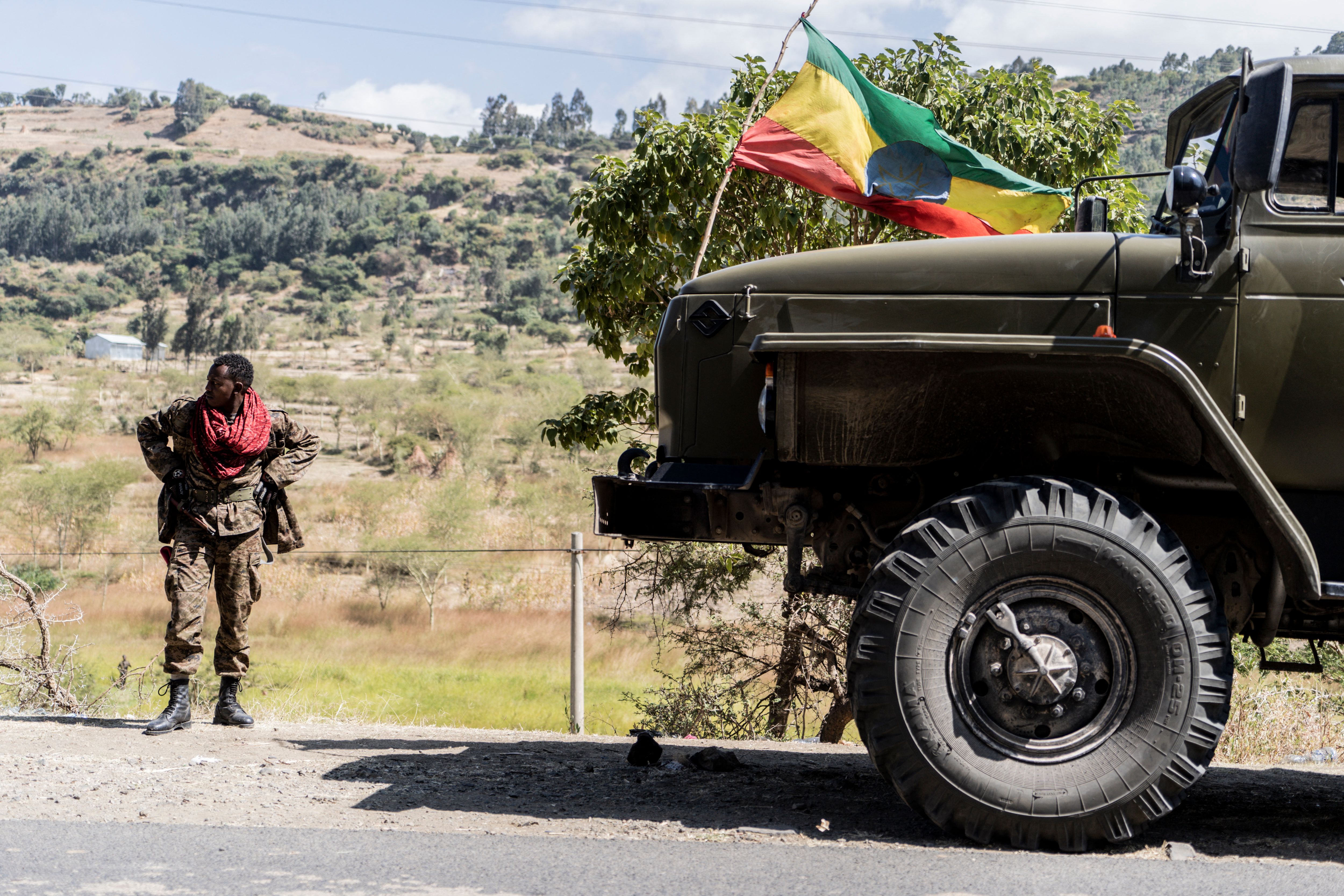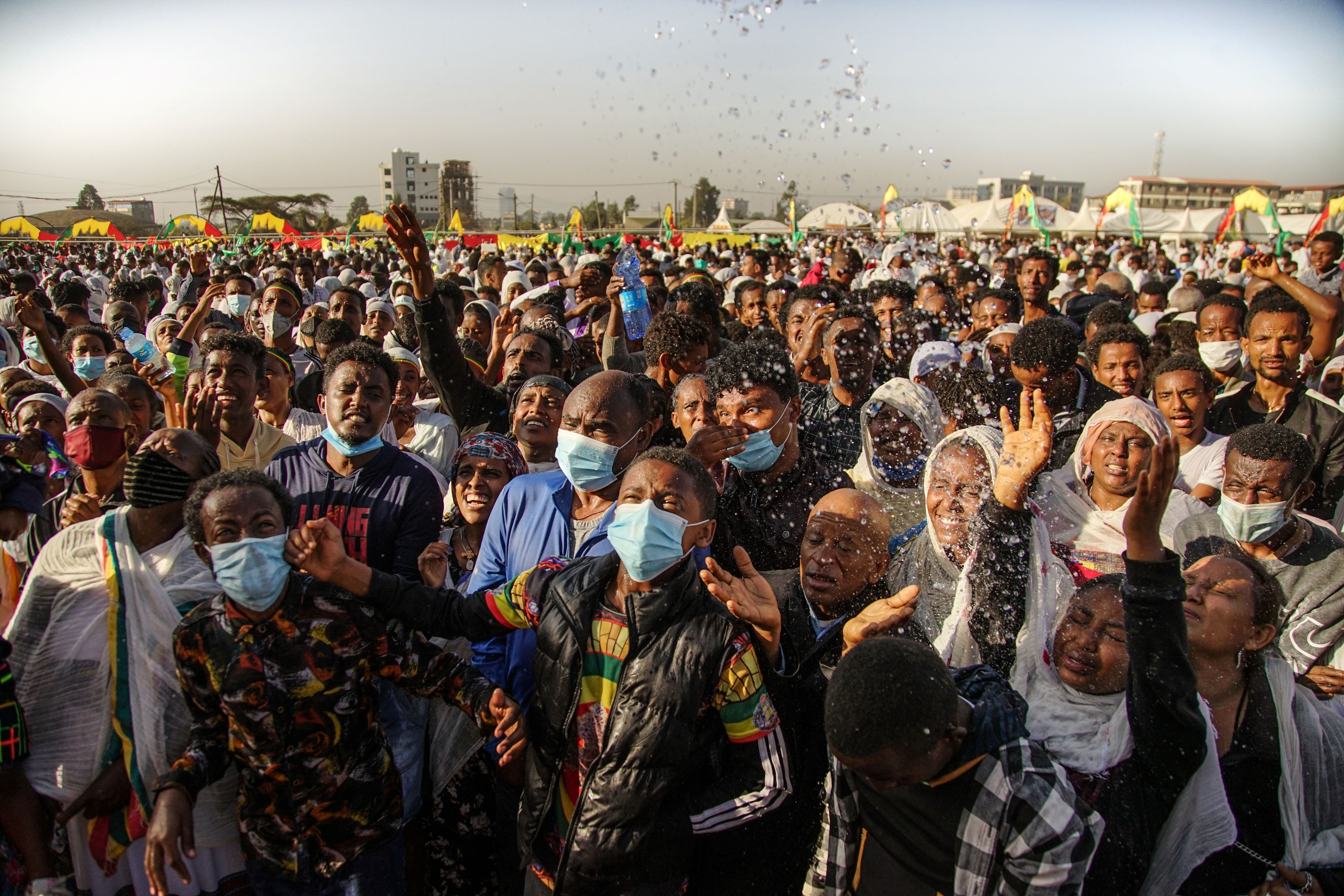Ethiopia’s diaspora visit home to help nation rebuild its image amid civil war
Ethiopians heading home for the Orthodox Christmas period say they want to support the government in its war with rebel forces from Tigray and challenge Western narratives of the conflict, reports Fred Harter

Ethiopia is welcoming thousands of its diaspora this month after encouraging them to come back for the Orthodox Christian festive period in a bid to prove the country is safe and open for business despite the year-long civil war in the north.
The conflict between the government and the Tigray People’s Liberation Front (TPLF) rebel forces – which erupted in November 2020 – has killed thousands of civilians and forced millions from their homes, while the fallout has hurt the economy.
Nevertheless, prime minister Abiy Ahmed urged overseas citizens to return as part of the “great Ethiopian homecoming” for festive celebrations, starting with Ethiopian Orthodox Christmas last week and ending with the Timkat festival on 19 January.
Among those to have returned is Mame Alemu, a 43-year-old who works for a school examination board in London. She was born in Ethiopia’s Oromia region but her family left for the UK in 1993 to escape political persecution under the country’s previous regime, which was dominated by the TPLF.
“I’ve come back to show support for the Ethiopian people and government, and to do whatever I can to help,” says Mame, who brought with her a suitcase brimming with surgical masks, medicines and other supplies, which she donated to the ministry of health on arrival.
Abiy called on a million diaspora to come home back in November, at a time when western embassies were advising their nationals to leave Ethiopia immediately following an escalation in the conflict that saw the TPLF advance towards the capital, Addis Ababa, and sparked concerns that violence could engulf the city.
The government insisted those warnings were alarmist while suggesting broadly that foreign countries were backing the rebels. In December it launched a major counteroffensive that pushed the TPLF fighters back into their northern Tigray region.
Having secured that military victory and averted the prospect of bloodshed in Addis Ababa, the government has rolled out the red carpet at Bole International Airport where traditional dancers and bouquets of flowers await those flying home.
Ethiopia’s diaspora is around two million strong, concentrated in North America, Europe and the Gulf. Since coming to power in 2018, Abiy has made a sustained effort to court them as a source of financial and political support.
In a welcome message, the prime minister urged those returning for the homecoming to visit areas affected by the war and to assist with efforts to rebuild them, while also calling on expatriates to do more to boost the economy.
It’s not much of a homecoming when Tigray is still under siege
Some of the diaspora taking part in the homecoming initiative described a festival atmosphere on their flights to Ethiopia, with passengers clapping and singing, and also raising thousands of dollars in donations while in transit to help people at home.
After experiencing some of the highest growth rates in the world over the last decade, Ethiopia’s economy has been battered by the war. Foreign currency has dried up along with jobs in the once-booming construction industry, and soaring inflation has seen a spike in the prices of everyday items such as cooking oil.
Before departing for her two week trip to Ethiopia on 30 December, Mame spent several weeks fundraising for causes including buying food for families of soldiers away on the front lines, while also collecting clothes for needy women and children.
Mame says “exaggerated” news reports suggesting Addis Ababa could fall to the rebels motivated her to head home, as she is determined to demonstrate that such media coverage was incorrect. She cites a specific report from CNN in November that suggested the rebels were just outside the city and used an outdated picture.
“It was misinformation, it was inaccurate and unhelpful,” she tells The Independent. “What they were saying did not reflect what we were hearing from our families. I think it had ulterior motives."

Her views – which are widespread among Ethiopians at home and abroad – reflect the government’s line. It has responded to international criticism of human rights abuses committed during the conflict in the north by suggesting that “foreign enemies” are working with the TPLF rebels to break up Ethiopia.
Last month, the US kicked Ethiopia out of the African Growth and Opportunities Act, which grants African countries tariff-free access to its market, citing human rights abuses committed in Tigray. In November, a joint report by the UN and the Ethiopian Human Rights Council found that all parties to the conflict are responsible for violations including massacres, rape and torture.
Zelalem Tessema, a local government officer for a London borough, had similar reasons to Mame for going home. He travelled to Ethiopia on 4 January as part of Defend Ethiopia UK, a pro-government advocacy group that raises money in aid of projects in Amhara and Afar, two regions affected by the war.
The 59-year-old says he is baffled by alerts from the US embassy urging Americans to leave Addis Ababa, and that he believes western governments are “trying to create hysteria” out of support for the rebels.
“The purpose of the homecoming is to demystify the false narrative of western governments and media houses that Ethiopia is going to fall apart,” Zelalem says, referring to statements issued by the US and others as the TPLF advanced that warned of Ethiopia’s potential implosion if Addis Ababa fell to the rebel group.
In response to international alarm over the conflict, pro-government members of the Ethiopian diaspora have held protests in several foreign cities including London and launched an online campaign dubbed #NoMore, which accused western journalists and diplomats of spreading misinformation aimed at undermining the government.

Last month, Mr Abiy’s spokesperson Billene Seyoum took to Twitter to address expatriates participating in the homecoming: “When the world said to run from home, your heart knew the truth!
Major hostilities have now ceased following the TPLF’s retreat to Tigray in December, although there are small skirmishes in pockets along the region’s borders and government jets continue to bombard the state.
Last week, an airstrike on a displacement camp in northwest Tigray reportedly killed 56 people, while local authorities said a drone strike killed 17 civilians on Monday – the same day that Mr Abiy had a phone call with US president Joe Biden.
During the call, Mr Biden raised concerns about civilian casualties caused by the strikes and also pressed for ceasefire talks.
With both sides pledging last month not to launch new major offensives, there are renewed hopes for peace. A newly passed law paves the way for a "national dialogue" process aimed at healing rifts, and the government last week released several imprisoned opposition leaders as a gesture of reconciliation to mark Orthodox Christmas.

However, in its current form the dialogue initiative excludes the TPLF and its ally the Oromo Liberation Army, the two main outfits fighting the government, which have been outlawed as terror groups.
“This process should be about including different voices and charting a better future for Ethiopia, but if it goes ahead without these groups, it will be illegitimate,” says Moges Zewdu Teshome, an independent analyst and former law lecturer at Haramaya University in Oromia, who fears fighting will resume without proper talks.
Meanwhile, Tigray, a region of 6 million people, remains cut off from the rest of Ethiopia, with most communication and transport links down. Some 400,000 people there are believed to be on the brink of famine due to obstacles to aid delivery, with no humanitarian supplies entering since 15 December, according to the UN.
The bleak reality in Tigray means that Rowena Kahsay, a British citizen of Tigrayan heritage who lives in London, and her family are not taking part in the homecoming. The 27-year-old charity worker says the initiative is a ploy to divert attention away from rights abuses and to raise foreign currency for the cash-strapped economy.
"I don’t feel like it’s for me," she says.
"It’s not much of a homecoming when Tigray is still under siege and the war is continuing. We can’t fly there or even speak to our relatives on the phone. It’s very clear who this is for: it is for people who support the war and the government.”
Join our commenting forum
Join thought-provoking conversations, follow other Independent readers and see their replies
Comments


Bookmark popover
Removed from bookmarks